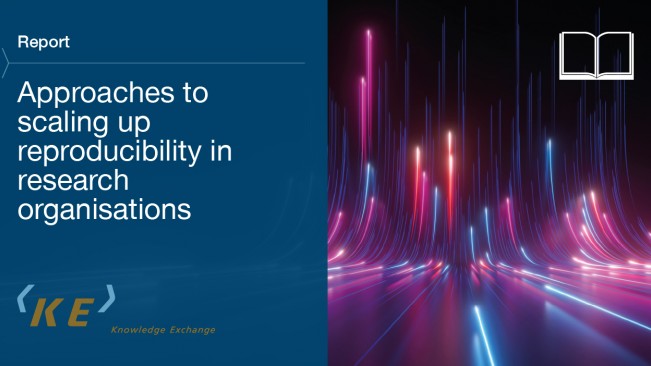
Reproducibility. Ensuring the same research results can be reached and reliably built upon time and time again, stimulating and advancing research. It is vital for ensuring that research results are correct and reliable. How can reproducibility be enhanced in research institutions and who are the stakeholders involved? This report delves into both and provides a framework for progressing reproducibility practices. It showcases the results of a literature review, survey, focus groups and community engagement carried out to understand what different stakeholder groups, from researchers to managers, need to increase uptake of good reproducibility practices within their institution.
Whether you are an institutional leader, professor, manager, head of department, librarian, researcher or PhD student, this report can help you. Its intention is to facilitate discussion, identify and enhance reproducibility practices.
What did we learn?
From our research, it is clear that organisations will benefit from a method in which they can assess areas where scaling up of reproducibility is already happening, and where further efforts will prove beneficial. We learnt that collaboration within research institutions is vital in broadening reproducibility practices. For example, one interviewee describes how a course was created with the privacy team and ethics committee and the benefits of this. Dialogue between different stakeholder groups, at all levels, enables collaborative working. This leads to viable solutions for a wider uptake of reproducible research practices.
Feedback from community and focus groups gave insight into how using relevant examples and case studies can help research organisations understand where they are with their reproducibility practices and how to enhance them. The report therefore identifies enablers for scaling up reproducibility, providing inspirational case study examples of how organisations have achieved this.
For example, find out how and why an institution has implemented different training courses tailored to postgraduates and staff. And why in another insitution, professional and academic departments have been encouraged to provide internships that concern research data management.
The Knowledge Exchange framework and how it can help
How can an institution gauge how effective its reproducibility practices are? Who is currently involved in this process and who should be? How can dialogue be started or progressed and what should be discussed?
The main output of this work is a framework for research institutions to understand how to support and enhance reproducibility practices internally. It can be used as a gap analysis tool and/or to stimulate conversation. It allows you to do three things:
- Talk about reproducibility at the different organisational levels.
- Identify enablers for scaling up reproducibility.
- Complete an assessment spreadsheet that will help you determine your institution's ability to support reproducibility practices, and act as an opener for discussions around maintaining or improving these.
Karsten Kryger Hansen, Senior Consultant, Aalborg University Library said: "The Danish Philosopher Søren Kierkegaard is quoted for having said; "If one is truly to succeed in leading a person to a specific place, one must first and foremost take care to find him where he is and begin there. This is the secret in the entire art of helping." This work presents a nicely arranged framework to enable and have a structured approach to fostering a scalable and sustainable reproduc-ability; our institutions' ability to work with reproducibility. We should always remember that we must be able to consolidate our efforts while simultaneously keeping our minds open for the innovators."
Read the full report Approaches to scaling up reproducibility in research organisations here.
The assessment worksheet and guidance on how to use it are here.
Our FDSR webpage provides full details of the work so far.









